by Assaf Dudai, the SPIN editor
Online gambling is exploding. Currently available in 85 countries (according to the American Gambling Association), it sees a compound annual growth of 10.73% and is expected to reach $66.59B by 2020, according to analysis by Technavio.
In 2016 it racked in more than $45B. According to the European Commission, $15B came from the European market, the strongest gambling market in the world, where online gambling accounts see an average yearly growth of 15%. Within the continent, it is United Kingdom leading the way with more than 18 million online gambling accounts.
Two things we can learn from these extraordinary numbers:
- Online gambling is extremely profitable
- The companies operating in this market are very skillful in running an online business
Do Gambling and Social Go Hand in Hand?
Since being effective online involves being active on social media, we decided to check how online gambling companies are doing on Facebook. These companies are masters in attracting incredibly large audiences.
We were curious to find out how they’re doing in engaging these audiences:
Would online gamblers openly interact with online casinos and bookmakers for all their ‘friends’ to see?
Would online gambling companies be able to engage their paying customers – would they even try?
We tracked 111 gambling / betting-related websites’ Facebook activity over a three-month period to check how the online gambling industry is doing socially. We created a KPI we call Engagement Rate to gauge their performance.
How We Analyzed Facebook Engagement
To reach the Engagement Rate of each page we used Facebook’s own metrics. We took the People Talking About This (PTAT) number and divided it by the number of Likes a page has.
We then added up all the Engagement Rates of the 111 websites and divided it by the number of pages to get the overall Average Engagement Rate.
The bottom line is: not so good.
The average Facebook engagement rate of gambling / betting websites on December 15th was 3.4%. On the 29th of March it was 2.5%.
That’s a 26% drop in engagement over a three-month period.
Let’s look at the glass half full. Here’s a break down of three of the biggest and best performing websites:
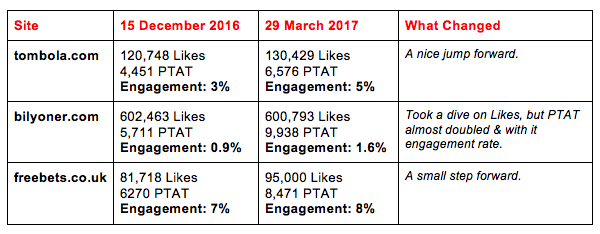
Another example, of one of the most well-known gambling brands in the world.
According to SimilarWeb, Williamhill.com brings in 22M visitors a month. Here are WH’s Facebook’s figures:
497,099 Likes | 847 Talking About This | 0.17% Engagement Rate (29.03.17)
(Figures for the WilliamHillSports Facebook page, the most active and ‘successful’ William Hill page by far.)
The difference between what WH manages to do on its websites and on Facebook is staggering. You can’t compare apples and oranges – paid (or organic) traffic is one thing and engagement on social networks is another, the two require completely different methodologies but still – the performance gap is curious.
Why Is the Gambling Industry Doing So Poorly on Facebook?
It seems that the online gambling industry has mostly given up on Facebook.
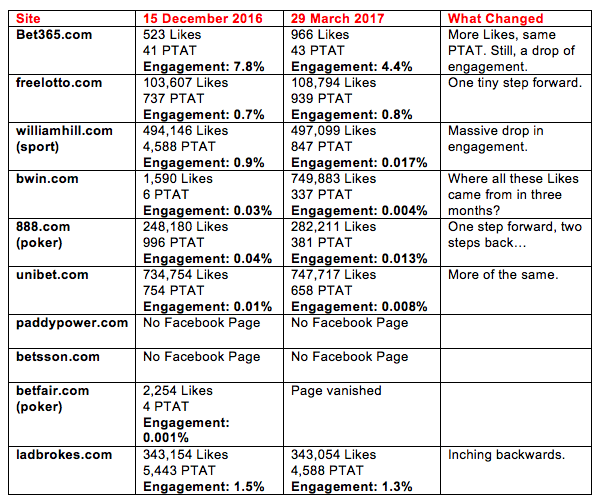
There can be 3 reasons for that:
- Gambling/betting companies don’t understand the medium
- Facebook users don’t want to ‘expose’ their gambling/betting activities to their friends
- Users simply don’t care to interact with gambling/betting brands like they do with lifestyle brands
Before we look into the three possible reasons, one thing must be highlighted – the sites in the table above (as are the rest of the 111) do manage to solicit Likes. Six of the pages in the table have more than 100K Likes. So the real failure is getting folks engaged after they like the page. This suggests weak content that lacks direction.
Online Gambling / Betting Companies Don’t Understand Social
Even without consulting with experts, this seems far-fetched.
The online gambling industry mastered SEO, monetization, affiliate marketing, customer retention and the mobile side of things. So social networks are the one aspect of the online world they couldn’t figure out?
An online gambling executive, who asked not to be named nor his company’s name mentioned, said there were two reasons his company was keeping an active Facebook page, even though the page is indeed low-performing:
“One is trying to maintain a social presence for the brand. If someone looks up the brand on Facebook or Google, having an active page with engagement – even if limited – can improve trust.
Second, since we run a lot of Facebook ad campaigns, some users end up on our Facebook page. We don’t want these users coming from ads to see an inactive page.”
This second reason feels like the jackpot. In order to use Facebook’s ad network you need a Page. The ‘numbers’ of your page have no affect on the effectiveness of your ad campaigns. You just need it to exist.
We had another question for the executive: what are you getting from your Facebook page?
“Not much. It’s really not our focus at the moment. It’s just supporting our brand presence on social. If some players come from it, that’s a nice bonus, but not the main goal.”
So it seems that online gambling companies don’t make a real effort to ‘make it on social’. Their piggybanks are full enough to pay for inbound traffic, and they seem content with this arrangement.
Must be something else.
Facebook Users Don’t Want to Expose Their Gambling Habit
That’s a possibility.
We are not referring to the U.S. market where online gambling is illegal in 47 out of 50 states (howdy Delaware, Nevada and New Jersey!) It makes sense that U.S. residents who gamble online behind a fake IP curtain wouldn’t want to share it on Facebook out of fear of prosecution.
In countries as England, Australia, Germany, Denmark – where online gambling is perfectly legal – are people worried about how they will be perceived if their ‘friends’ see them interact with a gambling/betting page on Facebook?
Is gambling/betting, even though legal, frowned upon?
We reached out to Dr. Natasha Dow Schüll, a cultural anthropologist and associate professor in the department of Media, Culture and Communication at New York University. Dr. Schüll is the author of the influential book Addiction by Design: Machine Gambling in Las Vegas, the result of 15 years of field research in the casinos and gambling halls of Vegas. It’s a must read.
We asked Dr. Schüll whether gamblers would share their habit with their social circle:
“Gambling is a solitary activity and not one they are likely to advertise to friends.
It’s socially acceptable to some extent, meaning, understood as something people do, but they often do it alone.”
So from what Dr. Schüll is saying, we can see that online casinos and bookmakers face an uphill struggle when it comes to engaging their audience on Facebook. If folks tend to keep gambling to themselves, social networks don’t seem like the ideal place open up about it.
Cigarettes have a similar faith; Marlboro doesn’t have a Facebook page and it’s a pretty safe guess that even if there was one, not many people would want to have their friends’ feeds littered with smoky posts.
Viagra is another example that comes to mind. Super popular brand, wouldn’t find it on Facebook.
Online Gamblers Don’t Care for Content and Engagement
Also a possibility.
Enjoying a certain activity doesn’t automatically mean there’s also a thirst to learn more about it. Jogging is an immensely popular physical activity in recent years, though not many joggers spend additional time consuming content about jogging, or interacting with brands that are recognized as ‘jogging brands’; yes, we’re talking about you Nike!
We turned to Allen Moody, a veteran, award-winning journalist of sports gambling culture to get his take on things:
“For sports betting, there really isn’t a whole lot of demand for content, such as teaching people how to handicap games, as most people are just interested in “who do you like tonight?” Very few people have the time to study the games themselves and have come to realize that, so most are just looking for somebody to tell them who is going to cover the spread. Football is a bit of an exception, primarily because there’s a week between the games and people can find a bit of time to look things over, but for the daily sports, like basketball or baseball, people are much more interested in getting picks.”
Why top online gambling brands, that have traffic by the millions to their websites, don’t care about content on their websites and Facebook pages? Is it because they don’t need content, or because gamblers don’t care about interacting – they just want to gamble?
“I think the reason a lot of sportsbooks don’t appear to be too concerned with their social media output or the content on their websites is that people will play at certain sportsbooks based on their reputation for paying their debts.
Bookmakers that have solid reputations will attract customers regardless of their website content. (I’m much more familiar with sports betting, but I’d say the same thing would hold true to some extent for online casinos.)
So, I’d say you’re correct that gamblers aren’t really interested in content or interaction, but just want to play.”
That’s Pretty Much Settles It Then
From the users side, they don’t care for interaction or engagement with the brands behind the online casinos and bookmakers, nor do they show an interest in further educating themselves by consuming content.
From the operators’ side, they accept the deal: provide the platform, keep the bonuses coming, and let the players remain detached. As long as players keep coming with their credit cards, who can blame them? Has anyone condemned Wilson for just manufacturing rackets and balls or not engaging folks?
Actually, Wilson has a pretty swinging Facebook page.
So the million-dollar question seems to be:
Should the Online Gambling Industry Even Try to Engage Its Users?
* This section is contemplating the bigger picture. If you’re not in the mood, skip to the next, more actionable, headline.
The online gambling industry has a gazillion users as it is, and an expected revenue of $66.59B by 2020. Why would it even bother with social media? It’s a valid question to ask.
Gambling, or betting, will always carry the humpback of being, as Dr. Schüll said, “socially acceptable to some extent”. We can assume the day when gambling is embraced by society as a wholesome pastime activity would never come. And the gambling industry is aware of that.
If we accept this assumption, the prospect of creating a lively community of happy-go-gamblers on Facebook is pretty slim.
The gambling industry is widely successful, online and off, in engaging its audience in actual play. Is there any benefit for them in attempting to bring added value?
Gary Vaynerchuck, a social media and online marketing mega-thought leader famously asked a Pepsi executive, when pressed to explain the ROI of social media, “What is the ROI of your mother?” Though crudely phrased, his intention was, as he later explained, to argue that some things cannot be quantified.
The value of social media to commercial brands is still hotly debated. It’s worth pointing out though that while the debate is going on, almost all commercial brands are pouring major resources into social media; a simple point that floats a giant question mark above the debate.
Social media happened by stride and now commercial brands have a huge additional task to tackle. Even if they perceive it as a chore, the fact that it did happen says a lot. It is simply undeniable that consumers, people, like it and enjoy it because they get something out of it. It’s probably similar to the something Vaynerchuck got from his mother.
Maybe, just maybe, the gambling / betting industry should try to provide its audience some of the same illusive benefit it derives from interacting and being engaged by other commercial brands on social media.
Can Gambling Websites Do Better on Facebook?
That’s a tough one. After three months of pouring over Facebook pages of gambling and betting companies, we aren’t too optimistic about their prospects.
A good example to look at, from a different industry, is RedBull, a company that’s doing a phenomenal job engaging its audience.
The RedBull Facebook page has 47,464,096 Likes, 2,010,933 PTAT (29.03.17) and an Engagement Rate of 4.2%. Even though the ER is similar, the sheer numbers that RedBull are dealing with are above and beyond.
What’s more interesting to consider is that their entire content strategy has, in a sense, nothing to do with their product. RedBull deals to its audience videos of people doing crazy shit. Just videos, of just that. Remarkably focused. Remarkably effective.
Is this a strategy gambling / betting companies should adopt? Dealing content that’s removed from their actual product?
What do you think? If you’re a social media expert and you think you have the answer to how the gambling industry can do better on Facebook contact me and I’ll post your advice here.
More Detailed Analysis
If you’re looking to delve deeper into the outcome of our analysis of 111 gambling/betting websites’ Facebook activity, here it is.
In this section you will find:
- What are the most engaging gambling/betting Facebook pages do
- What are the biggest gambling/betting websites (don’t) do on Facebook
- The full list of the 111’s Facebook metrics, December 15the 2016 & March 29th 2017
What Are the Most Engaging Facebook Pages Doing
Let’s have a look at what & how the most engaging gambling / betting websites do on Facebook.
tombola.co.uk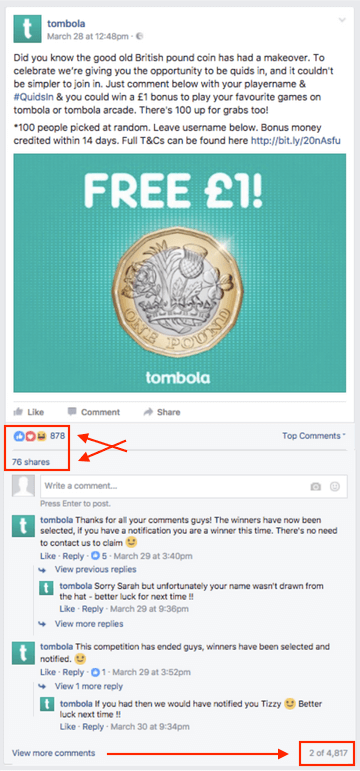
120,748 Likes | 4451 Talking About This
Frequency: 2-5 posts a day
Type of Activity: raffles, competitions and giveaways that require audience participation; strong sense of community
Form of User Engagement: incredible. Both Likes and comments are just pouring by the hundreds and even thousands. Tombola makes sure to be a part, to answer and engage directly with individual members of its community.
Bottom Line: really good understanding of what their community wants. Tombola provides its audience on Facebook the same thing they are providing them on the their website – light, fun engagement activities with a chance to win money.
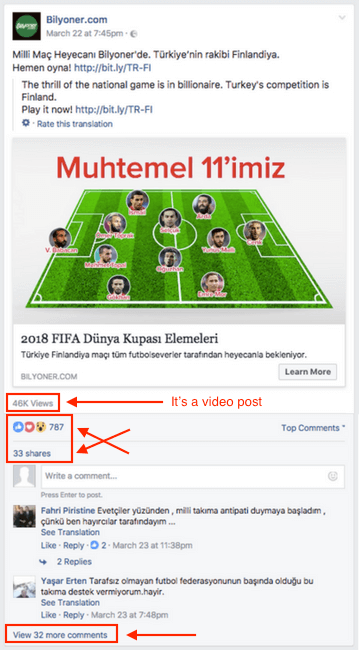 bilyoner.com
bilyoner.com
602,463 Likes | 5,711 Talking About This
Frequency: 2-4 posts a day
Type of Activity: videos of highlights from games (mostly soccer) and declaration of winners
Form of User Engagement: steady stream of Likes and a pretty active comments section, mostly one-liners that don’t require or solicit a response – there’s no interaction between the users
Bottom Line: everyone seems content, the page serves its purpose, even if an uninspired way
freebets.co.uk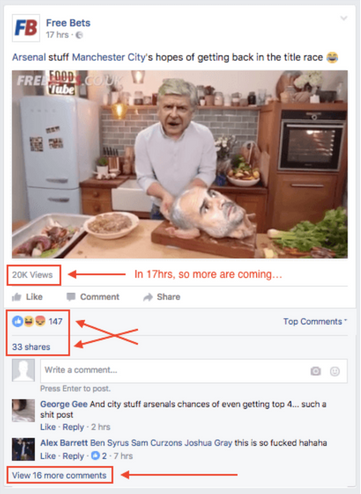
81,718 Likes | 6270 Talking About This
Frequency: 7-12 posts a day
Type of Activity: only soccer; links to new blog posts (about 5 a day); lots and lots of silly videos that are so popular on social networks, also soccer-related
Form of User Engagement: likes come and go, sometimes in the dozens, sometimes in the hundreds; comments are less frequent and are of the one-liner type, no real discussion; videos get tens of thousands of views
Bottom Line: Hallelujah, FreeBets discovered the power of whimsical videos on social media.
Not much to glean from, but there are a few conclusions to draw:
- If you want to establish an active Facebook page, don’t talk about gambling. It also helps if you don’t have the words “casino” or “gambling” in the page title.
- Keep it light and fluffy. This is Facebook. Keep the in-depth discussions to forums.
- Use lots of videos! Especially silly ones.
What Are the Biggest Websites (Don’t) Do on Facebook
bet365.com
966 Likes | 43 Talking About This
Frequency: random; about one post every two months
Type of Activity: lists of upcoming matches
Form of User Engagement: almost non-existent, sporadic Likes and spam comments
Bottom Line: not clear why bet365 keeps at it
freelotto.com
108,794 Likes | 939 Talking About This
Frequency: 2 posts a day
Type of Activity: one post previous day’s winning numbers, one post inspirational quote or a story of someone who won big
Form of User Engagement: some likes and comments regarding technical stuff (registration questions etc.) or basic comments such as “I wish I win today”
Bottom Line: no real interaction between the brand and its community
williamhill.com (sports page)
497,099 Likes | 847 Talking About This
Frequency: anything from one post every two days to five posts a day
Type of Activity: sport-centered, commentary to bets, odds and win stories
Form of User Engagement: very few Likes; comments are rare and when a discussion erupts, it’s usually around soccer, unrelated to betting – brand doesn’t take part
Bottom Line: their heart isn’t in it, no real effort
bwin.com
749,883 Likes | 337 Talking About This
Frequency: none; last post September 21, 2016
Bottom Line: abandoned Facebook eight months ago
888.com
*Only the 888Poker Facebook page is still active. All the other Facebook pages of 888 (casino, sport etc.) were abandoned.
282,211 Likes | 381 Talking About This
Frequency: 1-2 posts a day
Type of Activity: poker-focused; strategy questions to the community, shots of chips, cash and famous players
Form of User Engagement: changing volume of likes per post (between 21 to 664) and a good volume of comments in response to strategy questions
Bottom Line: missed opportunity. Community obviously enjoys the questions but brand never engages with them, doesn’t take part in the discussions
unibet.com
747,717 Likes | 658 Talking About This
Frequency: 1-2 posts a day
Type of Activity: sport moments, stats, memes and gifs; questions to the community about preferences, favorites etc.
Form of User Engagement: very few Likes, almost no comments – brand doesn’t manage to elicit engagement
Bottom Line: not trying very hard. Questions to the community tend to be very superficial (Will Liverpool win the EFL Cup? / Do you like Messi’s latest tattoo?)
paddypower.com
No Facebook page.
They have a profile page with two posts from April 2016, two posts from 2013 and one photo and one note from 2012.
betsson.com
No Facebook page.
betfair.com
120 Likes | 38 Talking About This
Frequency: daily posts
Type of Activity: promo codes, in English and Russian
Form of User Engagement: Betfair post a promo code, then uses two obviously fake profile accounts (Stefan Ivanov & Georgi Georgiev) to share it on various Facebook groups.
Bottom Line: Seriously?
ladbrokes.com
343,054 Likes | 4,588 Talking About This
Frequency: 5-10 posts a day
Type of Activity: mostly soccer moments, with scattered raffles and quizzes that allow the community a “chance to win” something; tons of Happy Birthdays to present and past footballers
Form of User Engagement: uneven, mostly likes, some comments of the ‘one-liner’ kind, no real interaction between the users or between users and brand
Bottom line: missed opportunity. When Ladbrokes “gets down to business” and talks bets, the community listens. Other times, just another soccer page.
Here it is, the full list:



